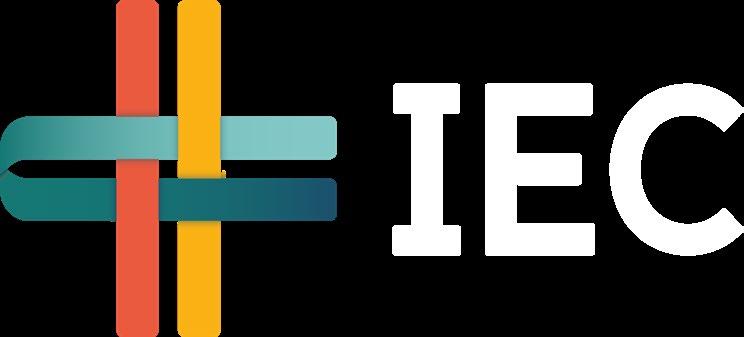






Dear Friends,
As we reflect on the past year, I’m grateful and excited for the progress IEC (Institute for Exceptional Care) the growing recognition of the importance of our mission. A senior healthcare leader who has advised IEC since our beginning shared a powerful observation with me. She used to eagerly explain IEC’s mission and programs to her colleagues, but last year, she noticed a shift. As soon as she mentioned IEC, the person she was speaking with would more likely jump in and explain to her what IEC was about. This is a testament to how our work to change how healthcare is taught, delivered, and paid for has begun to flow into healthcare consciousness at the highest levels of clinical, industry, and government leadership.
The growing interest in issues related to intellectual and/or developmental disabilities (IDD) has led to a convergence of healthcare and disability groups seeking to collaborate and learn from one another. The Alliance for Person-Centered Care and RAND have invited us to partner on defining and measuring high-quality healthcare and best practices for diagnosing co-occurring health conditions in people with IDD, respectively. Meanwhile, disability organizations such as Special Olympics International and the Society for Developmental and Behavioral Pediatrics are leveraging our expertise to develop best practices for clinicians to bill for inclusive healthcare services and recommend policy strategies to improve payments for their critical specialty services. Government agencies, such as the Centers for Medicare & Medicaid Services and the Office of the National Coordinator on Health Information Technology, have invited us to share our work and methods for authentically engaging community members, demonstrating their eagerness for ground-level healthcare insights and ways to infuse engagement into their own work.

These developments serve as powerful testaments to the timeliness and significance of IEC’s work, highlighting how our efforts align with the needs of both the disability and healthcare communities. As an organization that operates at the crossroads of these two communities, IEC is honored to act as a bridge, fostering vital connections and ensuring this movement continues to grow and thrive.
We are grateful for the support and partnership of so many individuals and organizations nationwide as we work toward a healthcare system that enables people with IDD to enjoy the best health possible and live life to the fullest.
Mai Pham, MD, MPH President & CEO
IEC brings together people with lived experience of IDD and healthcare professionals to work from within the system to change the way healthcare is taught, delivered, and paid for.
IEC’s work operates under these three pillars and is infused with the engagement of the people we support at every step of our planning and implementation.
Our programs change how healthcare is:
TAUGHT:
So that all clinicians feel confident and prepared to provide high-quality care and support for people with IDD.
DESIGNED AND DELIVERED:
So that it respects the priorities and needs of people with IDD.
PAID FOR:
So that providers can deliver whole-person, coordinated care and services that meet the needs of the IDD population.
HIGHLIGHTS ADVOCACY + ENGAGEMENT:
So that the expertise of people with lived experience of IDD is centered in all that we do.
Every day, IEC is delivering on its mission of building a movement that gives people with IDD the safe, informed, and high-quality care they deserve across every service and setting, and centering their perspectives in the co-creation of solutions.
Over the past 40 years, many of us have been working to create a more person-centered healthcare system. We have learned that it is hard work requiring clear thinking, commitment, and perseverance.
This past December, I was elected to succeed Bernie Rosoff as the new Chair of IEC’s Board. Over my three years as a director, I have seen IEC grow into a fast-moving and entrepreneurial organization, tackling its bold mission to make healthcare better and safer for people affected by intellectual and/or developmental disabilities.
IEC’s strategy for improving care for IDD individuals is to change the way we teach, deliver and pay for their care. This impact report demonstrates the remarkable progress the IEC team has made on projects that align directly with these three strategic pillars. Over the past year, we have launched the National Roadmap for Disability Inclusive Healthcare, created a new innovative digital app, Always Uniquely Me, and recruited more than 70 members into our IDD Advocate Corps. As this Impact Report documents, IEC has become a significant part of the IDD community and is starting to impact the lives of people with IDD.

However, we cannot create the broad-based change we seek without sustained financial support and project partnerships. I invite you to join us in this movement to transform healthcare for people with IDD and their families. Together, we can create a future where everyone receives the care they need and deserve.
Thank you for your commitment to this vital mission.
Richard Gilfillan, MD, MBA
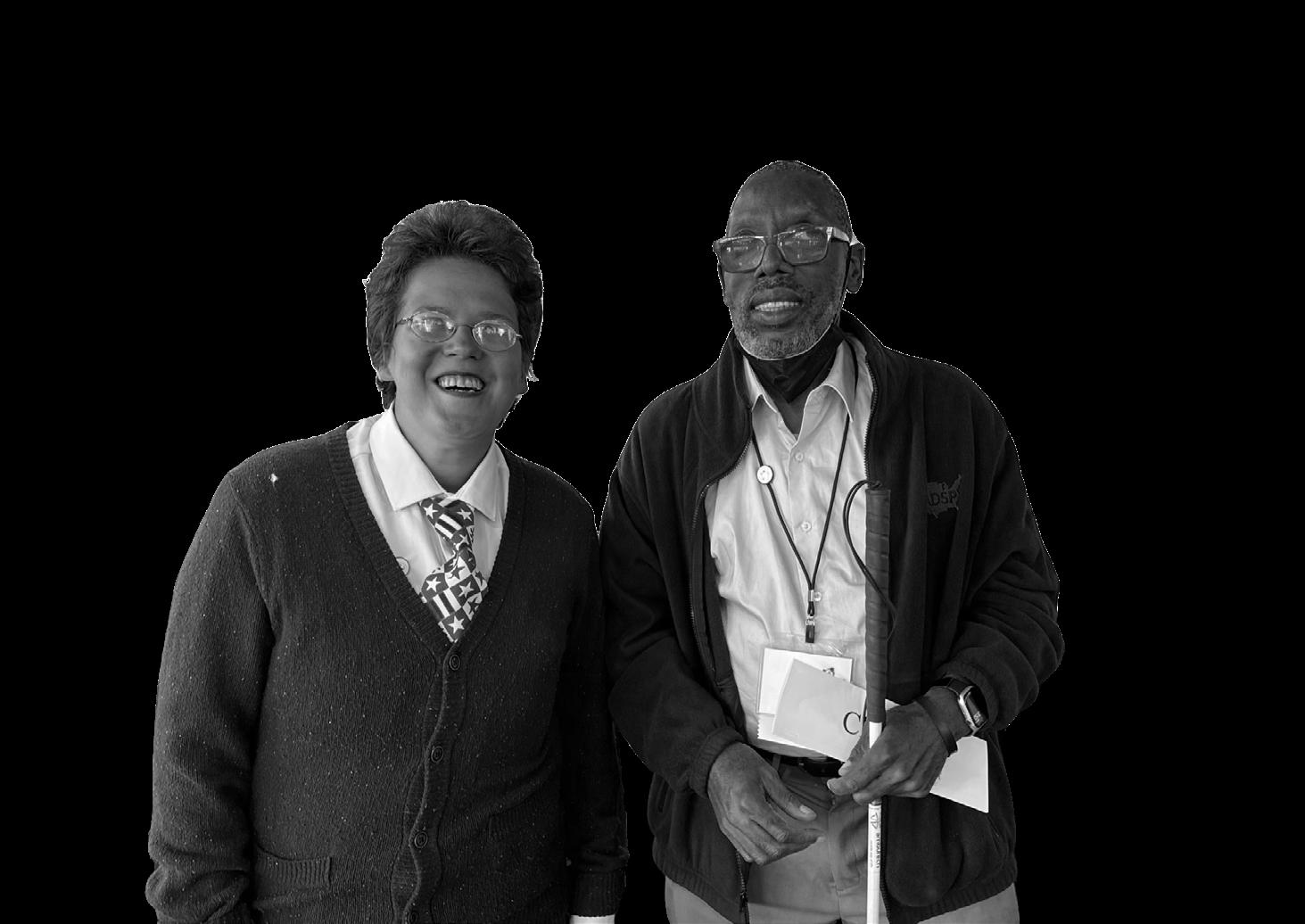
Intellectual and/or developmental disabilities (IDD) include conditions like Down syndrome, autism, ADHD, cerebral palsy, and many others. Estimates show there are at least 16 million people with IDD in the US.
• Developmental disabilities start when someone is born or in childhood and last for a person’s whole life. Developmental disabilities can affect many parts of a person, such as how they learn, grow, talk, think, and/or interact with others.
• Intellectual disability is a type of developmental disability that can make it more difficul to learn.
People with IDD experience health disparities that put them at risk for poor health outcomes, unnecessary and/or harmful procedures, and a shortened life expectancy. People with IDD:
• Have higher rates of chronic conditions, such as diabetes and heart disease, and a maternal mortality rate nearly six times that of the general population;
• Are less likely to receive preventive care, such as blood pressure and cholesterol checks or screening for vision and hearing problems;
• Are less likely to be screened for cervical, breast, and prostate cancer;
• Are more at risk for social isolation and have fewer emotional supports;
• Experience a suicide risk that is three times higher than the general population for those with intellectual disability, and six times higher in autistic individuals; and
• Who identify as Black, brown, or low-income represent 30% of the IDD population and have health disparities that are estimated to be even more pronounced.
For people with IDD and their care partners/givers, accessing high-quality healthcare that aligns with their unique needs and preferences has been a longstanding challenge. IEC is creating better and safer healthcare for people with IDD by bringing together people with lived experience of IDD and healthcare professionals to work from within the system to change the way healthcare is taught, delivered, and paid for.

When we center on the needs and perspectives of people with IDD, we are also building healthcare solutions that can benefit many other people. IEC’s approach promotes a system that is flexible and can adapt to individuals’ unique needs.
People with IDD too often face unmet healthcare needs, lower-quality care, lack of preventive services, and higher rates of chronic conditions and preventable deaths. This is due in no small part to healthcare professionals’ outdated assumptions and lack of understanding about IDD. People with IDD and care partners/givers often feel unheard and not respected in healthcare settings. Turning this around requires a genuine commitment to engaging, listening to, and partnering with the IDD community every step of the way.
Authentic engagement that builds trust by turning input into action is critical for designing care models, research, policies, and programs that improve well-being. IEC developed principles of authentic engagement to ensure that people with lived experience of IDD – self-advocates and care partners/givers – are equal partners in our work.
This work takes significant investment but pays dividends by establishing a sense of safety and trust, ensuring we identify the right issues, and creating inclusive solutions. IEC leans into our commitment to authentic community engagement in a variety of ways:
• All IEC organizational and programmatic advisory bodies include self-advocate representation, which totals approximately 90 self-advocates.

• Advisory bodies include self-advocates with a wide range of lived experiences, levels of experience and/or education, types of disabilities, cultural diversity and IEC ensures self-advocate partners are fairly compensated for their time,
If there’s a serious issue, IEC is going to face it head on. And then they’re going to come up with a solution for it.”
- Sherri Eldin
Sherri Eldin (she/her) first found IEC in 2022, when she participated in an ABC3 focus group of clinicians with IDD and has progressively become more involved ever since. Sherri is a founding member of IEC’s IDD Advocate Corps and a Steering Group member as part of IEC’s ABC3 Coalition. In December 2023, she presented on IEC’s behalf as a Northeast Arc Tank finalist at the John F. Kennedy Presidential Library and Museum in Boston, Massachusetts.

“IEC is talking about a lot of things that people think about, but are too scared to say out loud,” Sherri said. “If there’s a serious issue, IEC is going to face it head on. And then they’re going to come up with a solution for it.”
Partnering with IEC has not only helped Sherri feel validated in her identity as a person with disabilities, but also helped her gain the confidence to view her disabilities as a beneficial part of her identity, releasing the shame and stigma that had followed her for much of her life and catapulting her further into self-advocacy. Sherri has a unique role in the healthcare system, as she is both a patient with disabilities and a clinician with disabilities. This gives her a nuanced understanding of the many ways in which the system needs to make adjustments.
“IEC is helping me grow into what I’ve always wanted to become,” Sherri said. “Without IEC, I wouldn’t have had the confidence to move forward in my residency applications shamelessly as an applicant with disabilities, and ultimately land at a social justice-oriented program that values that a lot.”
As she begins her medical residency this summer, she is excited to continue partnering with IEC to make these changes happen.
IEC launched the Action to Build Clinical Confidence and Culture (ABC3) coalition to coordinate national strategies to prepare clinicians to better serve people with IDD. Despite nearly one in 20 Americans having IDD, clinical education programs are not required to teach about it. This means that physicians, nurses, dentists, physician associates, and other clinicians – whether in training or in practice – don’t get the preparation they need, even though most people with IDD rely on general healthcare practice settings for their care rather than specialized centers.
With so little training, it is not surprising that nearly two-thirds of physicians say they feel unprepared to provide quality care to people with disabilities, many of whom live with chronic physical and mental health conditions, leading to more interactions with the healthcare system.
The ABC3 Coalition – made up of self-advocates, care partners/givers, clinicians, and healthcare leaders – aims to scale change across education, licensing, and accrediting standards. In March 2024, following two years of exploration, focus groups, and collaborative work, the ABC3 coalition reached a major milestone: the launch of the National Roadmap for Disability-Inclusive Healthcare.
The National Roadmap for Disability-Inclusive Healthcare is a plan created to help ensure clinicians – such as doctors, nurses, physician associates, and dentists – give the best healthcare possible to people with IDD. Through the Roadmap, IEC and the ABC3 coalition aim to:
• Give clinicians (such as doctors, nurses, and dentists) the skills and confidence to serve people with IDD;
• Help clinical practices be welcoming and accessible for people with IDD;
• Offer clinicians a place to learn about working with people with IDD;
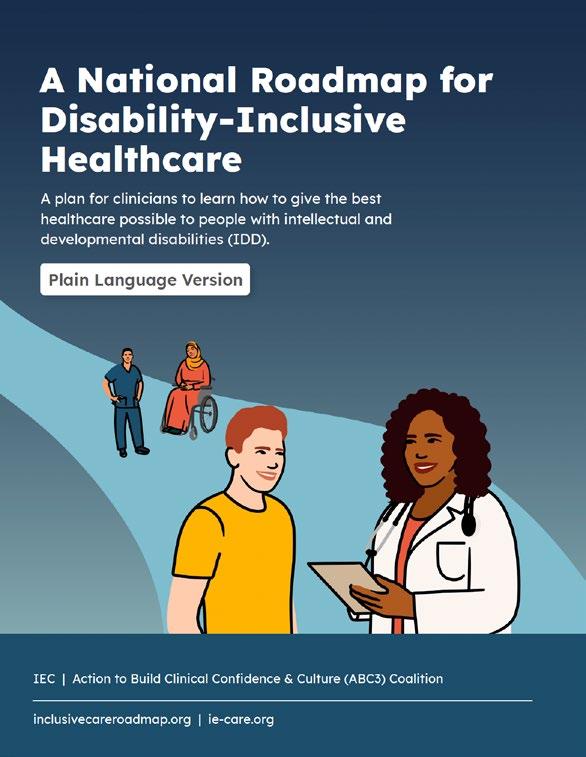
• Make sure that schools and other places that teach new clinicians have classes about serving people with IDD; and
• Make sure the rules and guidelines for how clinicians do their jobs include how to best serve people with IDD.
“People with IDD have been systematically marginalized and excluded, and their health outcomes have been worse because of it...Collaboration is essential to improving care. This was the most inclusive process I have been involved in.”
- Dr. Susan Hingle, Associate Dean for Human and Organizational Potential at the Southern Illinois University School of Medicine and member of the ABC3 coalition
The Roadmap lays out goals and actions influential healthcare groups can take to prepare clinicians to provide more equitable care.
• The Roadmap includes commonsense actions for five groups that are particularly influential in how clinicians are taught. These groups are trusted leaders working across the nation and can bring about change now and in the future. Examples of critical actions include developing a common curriculum on IDD across different health professions, and creating and sponsoring culture change campaigns that target clinicians-in-training and practicing clinicians.
• It contains an ideal clinician journey that illustrates the transformative journey a clinician may take from limited IDD understanding to readiness and commitment.
• It issues a call to action toward healthcare culture change nationwide.
ABC3 coalition members with expertise in developing standards, such as the Association of American Medical Colleges, and with experience training clinicians about IDD, such as the American Academy of Developmental Medicine and Dentistry (AADMD), IntellectAbility, and ECHO Autism Communities, ensure the Roadmap is robust enough to drive change at scale.
Some individuals with IDD face communication barriers, especially during stressful situations like medical and/or dental appointments and procedures. These situations not only present challenges for the individuals themselves, but also for medical and/or dental teams striving to provide quality care. IEC is proud to share two new partnerships that represent a significant step forward in realizing the goals set forth by the Roadmap, by actively working to equip healthcare professionals with the knowledge, skills, and confidence they need to provide equitable, accessible care to people with IDD.
IEC is partnering with Ability Central - a nonprofit working to ensure that people who are Deaf, disabled, and/or neurodivergent can communicate and access informationto produce a series of online continuing education courses. The series, titled Discourse, will train healthcare professionals on best practices for working with patients who experience communication barriers. Designed with an eight-person advisory council that brings together the expertise of clinicians seasoned in developing trainings and the lived experience of self-advocates and care partners/givers, the free first course will launch in February 2025.

Changing How Healthcare is Delivered
Seamless Care Alliance of Nassau and Suffolk (SCANS), a community-based pilot program on Long Island, New York, is working to address a healthcare experience many people with IDD and their care partners/givers say they dread and fear – the emergency department (ED).
What is already a high-stress experience for many of us may be compounded for people with IDD – a loud, overstimulating environment with personnel who often lack specialized knowledge and understanding, which can worsen or hasten the crises patients are experiencing. As a result, many people with IDD experience extended ED stays, unnecessary hospitalizations, chemical or physical restraints, avoidable stress for themselves and family, and unnecessary – and even harmful – tests and treatments.
SCANS tests new healthcare tools and processes aimed at reducing ED visits, improving ED care and experiences, and easing transitions back to the community for people with IDD.
As a coalition of self-advocates, care partners/givers, payers, and healthcare and community-based organizations, the SCANS team identified causes of avoidable ED visits and poor outcomes. They identified three priority areas for improvement and are developing solutions to test with local care facilities and organizations.
Areas for improvement include:
• A communication tool to foster efficient and on point/timely sharing of important information between people with IDD and clinicians, especially first responders;
• Access to expertise in treating people with IDD; and
• Care environments within emergency facilities.
Recent accomplishments to address each of these problems include:
• Designing, developing, and beta-testing the Always Uniquely Me app;
• Exploring a partnership with StationMD, a telehealth platform comprised of IDD experts, to design a pilot program where ED teams, group home staff, and other clinicians are given access to IDD clinical experts during urgent situations when they need it most – to triage and de-escalate problems and prevent ED visits, hospitalizations, and unnecessary testing or harm; and
• Beginning to identify best practices for emergency departments providing care for people with IDD.


Emergencies can be terrifying when you can’t communicate. The Always Uniquely Me App empowers people with IDD by providing a comprehensive digital snapshot of their healthcare information and personal needs to share with clinicians and first responders in any situation.
The SCANS coalition identified the ability to quickly share critical information as a top priority to improve the care experience and communication between people with IDD, their care partners/givers, and clinicians. Together, they co-designed this first-of-its-kind app to help ensure a safe, comprehensive, and positive healthcare experience for people with IDD.
The app offers clinical teams a holistic view of the individual, allowing people with IDD and/or their care partners/givers to upload quick emergency info and a detailed medical history as well as communication preferences, triggers and calming approaches, and more. It also saves individuals and care partners/givers from the stress of repeating background information, which adds to the stress of emergency and hospital care.
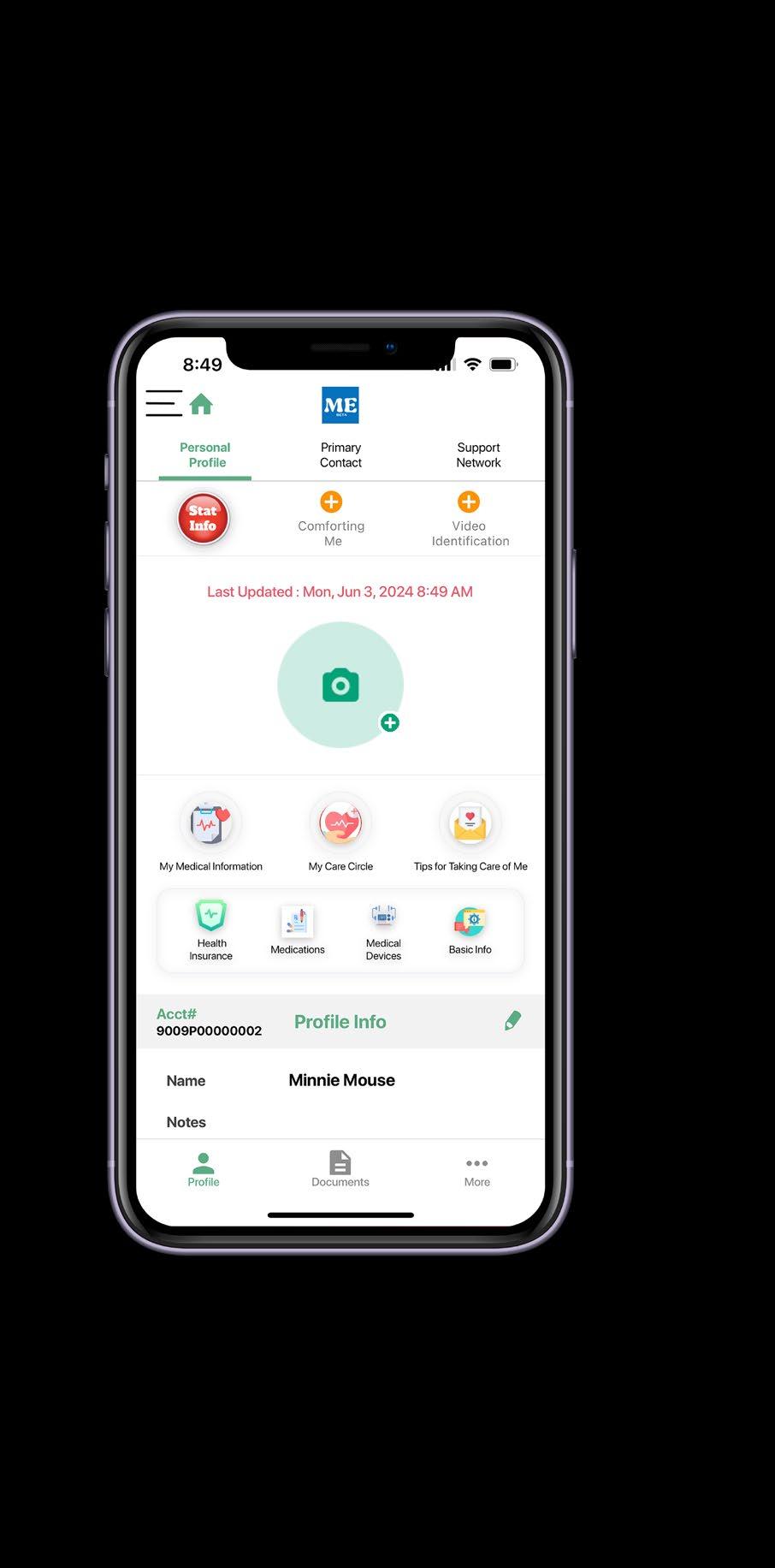
Following strong positive feedback during beta-testing in 2023, we will begin and evaluate a formal research pilot of the app with Northwell Health later in 2024.

“We should be shouting this from the mountaintops - everyone needs the Always Uniquely Me app!”
– Josh Rocker, MD, Emergency Department Chief, Cohen Children’s Hospital
Changing How Healthcare is Paid For
IEC launched the IIDDEAL (Individuals with IDD Engaged, Aligned, And Leading): Outcomes That Matter project, operated in partnership with Augusta University and Brandeis University, to address the lack of comprehensive understanding of the healthcare needs of people with IDD.
People with IDD are historically underrepresented in research, clinical leadership, and policymaking. Additionally, the aspects of health that are evaluated in research, quality improvement efforts, or financial mechanisms that hold clinicians responsible for their patients’ outcomes do not always reflect the priorities of individuals with IDD.
This disconnect has resulted in a healthcare landscape that often focuses on the wrong things and fails to deliver person-centered, equitable care for people with IDD and help them achieve their goals. IIDDEAL will identify priority health outcomes that matter to people with IDD and their families and how stakeholders can support those outcomes.
These health outcomes are intended to inform future research, guide healthcare and insurance decision-making, and, ultimately, improve the quality of life for people with IDD and their families. To achieve this, the following work was undertaken between January 2023 and March 2024:
• Holding focus groups with self-advocates, family care partners/givers, clinicians, and payers;
• Convening a National Consensus Workgroup to develop goals for a draft consensus health outcomes framework; and
• Hosting two Policy Summits to connect with federal healthcare leaders and begin to socialize the draft health outcomes framework.
IIDDEAL convened a national Consensus Workgroup – including stakeholders with IDD, care partners/givers, clinicians, insurers, regulators, quality measurement experts, researchers, and more –from May through September 2023 to develop goals for a draft community-led model for improving health outcomes. The framework builds on the work of focus groups with over 125 individuals, which generated nine health outcome domains. The Consensus Workgroup drafted 43 national goals to achieve by 2035, prioritizing supportive elements with the highest potential for impact to address each of the nine health outcome domains.
The outcome domains, priority elements, and goals to support them are presented in IDD Health Outcomes that Matter: Community-Led Standards for Improvement, which opens to public comment in 2024.
In November 2023 and March 2024, IIDDEAL hosted Policy Summits to connect with leaders from federal, state, and private sector organizations and share the identified health outcome domains, priority elements, and proposed national goals.
Attendees contributed their perspectives on how the proposed national goals align with initiatives at their own agencies, discussed potential challenges for implementing such solutions, and shared opportunities for maximizing impact by 2035.
The Policy Summits attracted 56 attendees, including leaders from influential national organizations such as:
• Centers for Medicare & Medicaid Services (CMS)
• Agency for Healthcare Research and Quality (AHRQ)
• Administration for Community Living (ACL)
• Centers for Disease Control and Prevention (CDC)
• Office of the Assistant Secretary for Planning and Evaluation (ASPE)
• National Committee for Quality Assurance (NCQA)
• National Association of Medicaid Directors (NAMD)
• Autistic Self Advocacy Network (ASAN)
• Special Olympics International
“I was overwhelmed with the dedication and passion of the attendees at yesterday’s policy forum. I’ll be reporting key learnings to my leadership team.”
- U.S. Department of Health and Human Services Leader
• The American Academy of Developmental Medicine and Dentistry (AADMD)
• National Quality Foundation (NQF)
• Blue Cross Blue Shield (BCBS) of Massachusetts
• National Association of State Directors of Developmental Disabilities Services (NASDDDS)
• Office of the National Coordinator for Health Information Technology (ONC)
• Leavitt Partners
• Robert Wood Johnson Foundation
• Patient-Centered Outcomes Research Institute (PCORI) and
• RAND Corporation
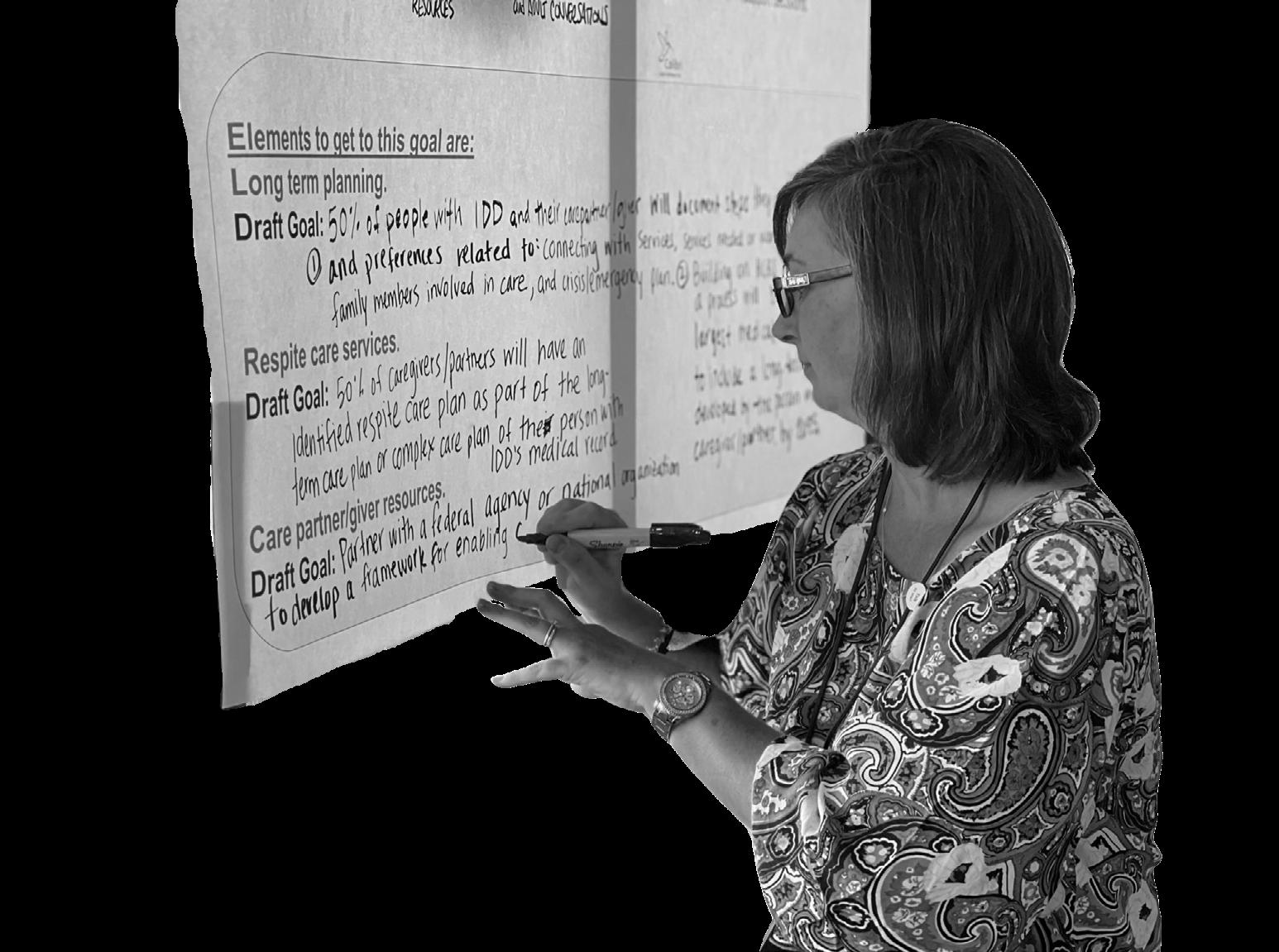
Changing How Healthcare is Paid For
IEC knows that better claims data is a critical first step to improving the lives of people with IDD – you can’t serve someone invisible to you. IEC launched Making IDD Visible, a multi-year project using artificial intelligence (AI), to support people with IDD by better identifying them in clinical and claim data, addressing disparities, and building a more supportive and effective healthcare system.
Currently, many people with IDD are poorly identified in standard healthcare data. These data gaps have far-reaching impacts, denying people with IDD the resources they need to thrive, leading clinicians and insurers to make wrong decisions that can lead to harm, reinforcing a false perception that the IDD population is small and their needs are a “niche” problem.
Making IDD Visible will build an AI tool that will help identify children and adults who are likely to have IDD, using clinical and billing data on over 1,000 patients and leveraging the lived expertise of people with IDD, clinicians, data scientists, and data ethicists.
The tool will be usable by clinicians, payers, government, researchers, and other organizations that adhere to rules for appropriate, safe, ethical, and respectful applications. It will empower people with IDD, enable better measurement of health outcomes that matter to them, and create a true understanding of how healthcare is utilized. Effectively targeting services and identifying trends in spending will pave the way for critical investments in high-quality, empathetic care that meets the unique needs of people with IDD.
• We are making significant progress in identifying major sources of data bias – the first step in building an algorithmic tool that will be as accurate and fair as possible, while respecting the priorities and concerns of the disability community. We also added two self-advocates and two experts in data ethics and algorithmic bias to the project team to help accomplish this.

We are developing an analytic approach to building and validating the algorithm, by first focusing on people with autism and/or intellectual disability and applying a combination of different artificial intelligence strategies.

It’s impressive how many different stakeholders there are in IEC. There’s a lot of brilliance in the room, and I’m glad I can be a part of it.” - Jason Harris

As the founder of Jason’s Connection, Jason Harris (he/they) wanted to create an online space where people with disabilities could learn from each other and continue to fight against societal stigma. Created in 2013, Jason’s Connection is a Facebook community with more than 325,000 followers that connects adults with disabilities and creates a space for conversation, resource sharing, and current news and information.
Jason became involved with IEC through serving on the core team and Ethics Work Group for the Making IDD Visible project. He was excited to learn about the organization’s patient-centered model. To Jason, that means leading with curiosity and seeing patients not just as numbers, but as individuals with a unique set of lived experiences. Jason said he appreciates how IEC centers the voices of individuals with IDD as the organization works to make the healthcare system more equitable.
“When it’s only your own voice, talking in a vacuum, there can be pitfalls,” Jason said. “It’s important to be a part of something bigger. It’s impressive how many different stakeholders there are in IEC. There’s a lot of brilliance in the room, and I’m glad that I can be a part of it.”
Jason said he hoped to see providers take an active interest in the lives and interests of their patients with IDD and to build a set of clinical best practices that focus on each individual patient.
In November 2023, we officially launched the IDD Advocate Corps, a groundbreaking grassroots effort that brings together people with lived experience of IDD and healthcare professionals to create a more inclusive healthcare system.
Implementing large-scale change within the US healthcare system is a complex undertaking – coordinating efforts among healthcare professionals, institutions, payers, and policymakers requires a delicate balance to ensure alignment of goals.
Working from within the system is crucial to achieving meaningful and sustainable change. Internal stakeholders can act as allies and advocates for change, influencing their peers and promoting a culture of innovation and inclusivity.
However, the support of healthcare insiders is only one piece of the puzzle. The experiences and needs of people with IDD are routinely excluded from healthcare decision-making. Only when their perspectives are consulted and valued will the system not only accommodate – but fully embrace – the diverse needs of people with IDD.
In early 2023, IEC brought stakeholders together to form a Founding Advisory Group made up of 23 self-advocates and healthcare leaders from across the country. Together, they developed the core values, goals, activities, and structure for the IDD Advocate Corps. Upon launching in November, we received over 160 responses and welcomed 52 new members to the Corps in May 2024. Additionally, IEC and Founding Advisory Group members held interviews to select 25 self-advocates and healthcare professionals who will help co-lead six initial workgroups and committees of the Corps:
• Governance & Membership Committee
• Research & Learning Committee
• Communications & Planning Committee
75 ADVOCATE CORPS MEMBERS
• Policy Committee
• Self-Advocate Commons
• Health Systems Workgroup
IEC was also named one of seven finalists for Northeast Arc Tank 5.0 in December 2023, where three of our partners made a pitch before a panel of judges to support advocacy training and collaboration tools in IDD Advocate Corps.
It’s all about reclaiming our ability to have a voice and to have influence over our lives and our bodies...” - Yolanda Vargas
Yolanda Vargas (she/her) has been an advocate since she turned 18, when she joined a class-action lawsuit against her high school for failing to appropriately accommodate the transportation needs of students with disabilities. Ever since, she’s been advocating on behalf of herself and others who are navigating systemic barriers in society that prevent equitable access for people with disabilities.
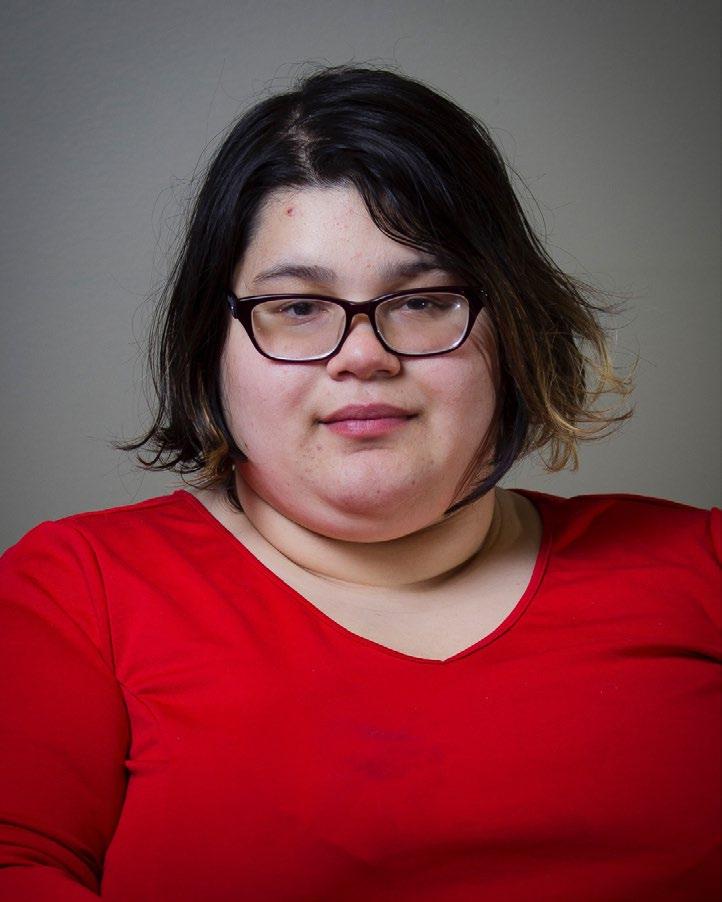
“The world is tough for disabled people,” Yolanda said. “As much as we want to believe it’s better, there are so many systemic barriers for disabled folks. There’s so much more work to do.”
Yolanda first became involved with IEC in 2022, when she contributed her healthcare story to IIDDEAL. She loves that IEC connects people with IDD to those who have power to make healthcare decisions, and that the organization prioritizes the voices of people with IDD. Yolanda is a founding member of the IDD Advocate Corps and serves as a co-lead of the Communications & Planning Committee. She said she was drawn to the IDD Advocate Corps because it allows IEC to see what’s coming before people who are entrenched in the systems or industries register the issues.
“It’s all about reclaiming our ability to have a voice and to have influence over our lives and our bodies,” Yolanda said. “I’m grateful to do both parts of what I love –lifting people up and fighting for their rights – without having to sacrifice my own well-being.”
To Yolanda, IEC’s greatest asset is its ability to remain nimble while providing a structure that allows people to share their stories and insights for the betterment of the whole community. She is excited to continue to partner with IEC to help create a more equitable future for people with IDD.
Articles
• Introducing the National Roadmap for Disability-Inclusive Healthcare by Helen Journal
• National Coalition Sets Roadmap to Improve Health Care for Those with IDD by Disability Scoop
• Health Groups Aim to Improve Care for People with Intellectual Disabilities by Axios
• New HHS Disability Access Rule to Bring Big Change to Healthcare by Modern Healthcare
Interviews
• Media tour for Developmental Disabilities Awareness Month with the Robert Wood Johnson Foundation, resulting in interviews featured by CBS News, WNNK-FM in Harrisburg, PA, the NBC Affiliate in Greensboro, NC, and more.
• MD+ Podcast
• Medicare Meet Up Podcast
• Jason’s Connection: Improving Healthcare for People with IDD
• Rx Foundation Q&A
• Different Brains Podcast
• What’s Working in Washington Podcast
Publications
• The Role of Payment and Financing in Achieving Health Equity in Health Services Research’s Special Issue on Healthcare Equity
• Beyond Demonstrations: Implementing a Primary Care Hybrid Payment Model in Medicare in Health Affairs Scholar
• Valuing America’s Health: Aligning Financing to Reward Better Health and Well-Being from the National Academy of Medicine
Panels & Presentations
• Harvard Medical School & Boston Children’s Hospital’s Optimizing Transitions from Pediatric to Adult Care
• “Working Together to Achieve Health Equity” at ARC Disability Policy Seminar
• Developmental Disabilities Nurses Association Annual Conference
• Equitable Professional Societies Network – Leadership Roundtable
• The National Academy of Medicine’s Leadership Consortium
• Northeast Arc Tank 5.0 Finalist: IDD Advocate Corps
• NEJM Catalyst How to Finance Health Roundtable
• “What Healthcare Can Learn from People with Intellectual and/or Developmental Differences” - Stanford Neurodiversity Summit
• “Shortchanged: How Medicare’s Physician Fee Schedule Undervalues Primary Care & Shortchanges Patients & Female Physicians” - Primary Care Collaborative
• “Standardization ≠ Equity: Supporting Health Outcomes That Matter Most to People with IDD.” - CMS Health Equity Conference
• “Unequal Treatment: Confronting Racial and Ethnic Disparities in Health Care” - Urban Institute
• The Administration for Community Living’s IDD Counts Summit
• “At Center Stage: Primary Care As the Foundation for Payment Reform”
- Capitol Hill Briefing

Our Board contributes diverse perspectives, backgrounds, and expertise to help guide and strengthen our mission and work.
• Rick Gilfillan, IEC Board Chair; Independent Consultant
• Robert Galvin, IEC Board Vice Chair; CEO, The Right Doctor; Senior Advisor, Blackstone
• Staci Alexander, Vice President, Thought Leadership, AARP
• Julia Bascom, Former Executive Director, Autistic Self Advocacy Network
• Rima Cohen, Founder & Principal, Rima Cohen Strategies, LLC
• Cuong Do, President and CEO, BioVie, Inc
• Cathy Farmer, Co-Founder, Autism Angels Group
• Chester Finn, Individual and Family Advocate, New York State Office for Persons with Developmental Disabilities (OPWDD)
• Dena Gassner, Adjunct Professor, Towson University
• Matthew Holder, CEO, Kramer Davis Health
IEC’S BOARD:
75% WITH IDD OR FAMILY CONNECTION
31% MEDICAL DOCTORS
• Margaret Nygren, Executive Director & CEO, American Association of Intellectual and Developmental Disabilities (AAIDD)
• Morénike Giwa Onaiwu, Educator, Autism & HIV advocate
• Bernard M. Rosof, Emeritus Chair, Professor of Medicine, Zucker School of Medicine at Hofstra/Northwell; Board of Directors, Huntington Hospital, Northwell Health System
Board of Advisors
Our Board of Advisors includes senior advisors and former IEC Board members who provide targeted advice to IEC’s leadership team.

Merrill Friedman, RVP, Inclusive Policy & Advocacy, Elevance Health Executive Vice President, Chief Managed Care and Business
MD, Professor of Pediatrics, Harvard Medical School and Associate Chair of Pediatrics, Massachusetts General Hospital for Children
IEC’s work is made possible through the generous support of forward-thinking partners. We’re grateful to the institutions and funders who share our vision for an equitable and high-quality healthcare system.
• AARP
• Adam Hjerpe
• Anthony-Maymudes Family Foundation
• Arnold Ventures
• Berkeley Research Group LLC
• Bernard and Adrienne Rosof
• Cuong Do
• Emily and Greg Waldorf
• Eugene M. Lang Foundation
• Gary and Rowena Roodman
• Healing Works Foundation
• Howard and Lizzie Gold
• Jane and Daniel Och
• Lloyd and Debbie Myers
Additional Support
• Optum Services Inc.
• Patrick and Mary Lou Irvine
• Richard Gilfillan
• Rima Cohen and Sean Cavanaugh
• Robert Berenson
• Robert Galvin and Gail D’Onofrio
• Robert Wood Johnson Foundation
• Saul Schottenstein Foundation
• The Commonwealth Fund
• The Fay J. Lindner Foundation
• The Karp Family Foundation
• The Pham Roodman Family Foundation
• WITH Foundation
IEC would also like to thank Covington & Burling LLP, Sachs Policy Group, and Milliman for their pro bono services.
Support IEC’s mission with a one-time or recurring gift! Visit our Donate page to learn more.
January 1 – December 31, 2023
IEC Revenue
Total: $1,250,463
73% Grants and contributions
0.6% Investment income
26% Contracts
IEC Expenses*
Total: $1,834,419
67% Programs and Services
*2023 was a deliberate investment year for IEC: We hired three new staff members and engaged in foundational branding and messaging work.
18% Fundraising
15% General and Administrative

